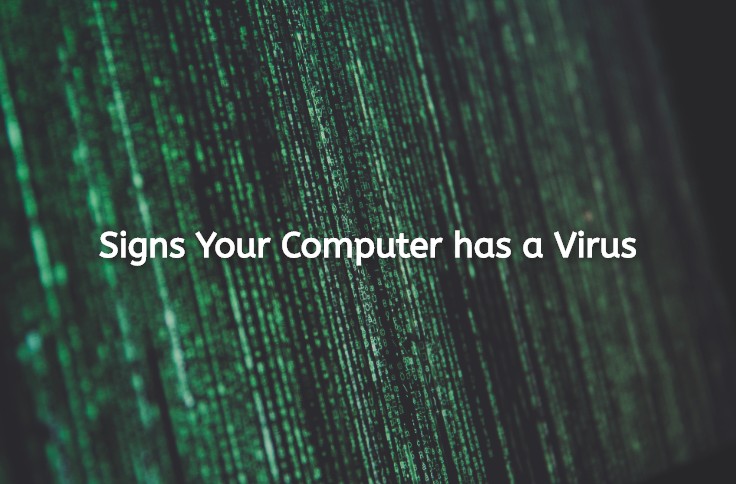How to Tell When Your Computer is Affected by A Virus

We know that how much we are dependent on internet not just for our jobs, but also for our day to day activities, starting from entertainment, social networking, shopping, to banking and more.
With the ever increasing usage of internet, also grows the number of malware threats to your system. These malware are fiendish to your device as well as to your data and security.
You prevent loss you need to do more than installing an anti-virus program.
Signs Your Computer has a Virus
In case you have not installed an anti-virus program, or you feel that your anti-virus program is not efficient in detecting a malware, here are the seven signs that tell that your computer is malware infected.
1. Not able to open the Task Manager
One easy step to check whether your computer has got virus is to open the task manager. Press together ctrl+alt+del.
The task manager should show up. If not, your computer might be virus infected.
But this is not the case always. There are some malwares that can show the task manager and still harm your computer.
2. Your computer is running slow
If your computer takes more times than it usually takes to perform tasks, to run programs or to boot the OS, then it is a potential sign that a malware is harming your system.
Before making it sure, check whether your RAM is alright. If you have don’t have enough space in RAM, your computer will eventually slow down.
If your RAM is ok and still your computer is slow then your computer is malware infected.
3. You see a lot of pop-up ads
One way to know that your computer is disturbed by a malware, most probably a spyware, is the annoying appearance of pop-up ads.
Most times, the ad messages will tell that your computer is at risk and will offer a free recovery program. Do not ever click any of the ads, as it will lead you to install bogus software.
If you see numerous such ads and you cannot block the ads then your computer has got virus.
4. Programs crashing down
If certain programs don’t run properly and crash down frequently, your system might be affected by malwares. A program may sometime crash if there is another program which is a counter part of the former.
But if you are sure that there are no such technical issues and your programs crash down, then you need to look for an antivirus solution.
It is also possible that your programs language settings are changed and a different language is enabled.
You likely have a virus in your system, if you cannot change these automatically changed language settings.
5. Abnormal hardware and network activities
To say strictly, malwares target your hard drives. Receiving notifications that you are running out of disk space while you do not have any resourceful files, is a sign that your hardware is corrupted.
Note the hardware lights.
If it blinks when you don’t run a program or you hear a disk loading sound whilst no program is running, then it could be because of the fact that the malware has taken control of your hardware.
If your files are misplaced in a different or new folder, without you knowing of it, or if your files have disappeared all for once to nowhere, then your system most likely is influenced by a hideous virus.
6. Your browser shows new features without your knowledge
One of the prospective ways to identify that your computer has got an infectious malware is observing the extra undesired changes in your browser without your knowledge of doing so.
Suddenly if you see your home page is changed, or the wallpaper is changed or you see a new tool bar on the window, then there is no doubt that a virus has done these modifications.
Your browser might lead to you to a different web-site rather than the one you want.
In such cases, do not click any of the contents of the misdirected webpage and close it using task-manager. Do also make sure you are running the right version of chrome or firefox.
7. Your friends receive spam mails and messages from you
Malwares achieve their aim of spreading to others by using your account to send spam mails and messages to your friends.
Your e-mail contacts and Facebook friends may receive spam mails from you, without you sending the mails to them.
This could be the function of a malware infected program or app that uses your accounts to send such mails to your friends.
To stop further proceeding, make sure that you have logged out of your social networking and blogging accounts, and use different and strong password for each account. Generate a strong and memorable password here.
Protecting Computer from Virus
No matter whether your computer is virus infected or not, there are some basic steps that you need to take to protect your device and files.
- Install a trusted anti-virus program to guard your computer. There is a lot of anti-virus software both for free and for cost. Make sure that your anti-virus software updates automatically. There are also a range of free online virus scans that help you when have not installed an anti-virus solution.
- Do not trust websites that offer freebies and say that your computer needs protection. These are the deceiving ways to make fool of you and such web pages are full of malware contents. Clicking any of its contents will result in click-jacking and may cost your money and security.
- Do not allow any program to access the firewall. The first job of a malware will be modifying the functions of firewall. So, if any program that you’ve recently installed, requests access to the firewall, delete the program.
- As a last resort, if nothing works, you may need to wipe your laptop clean and install the OS again.
Do you have any more tips to tackle a computer virus? Do let our reader know in comments below.

